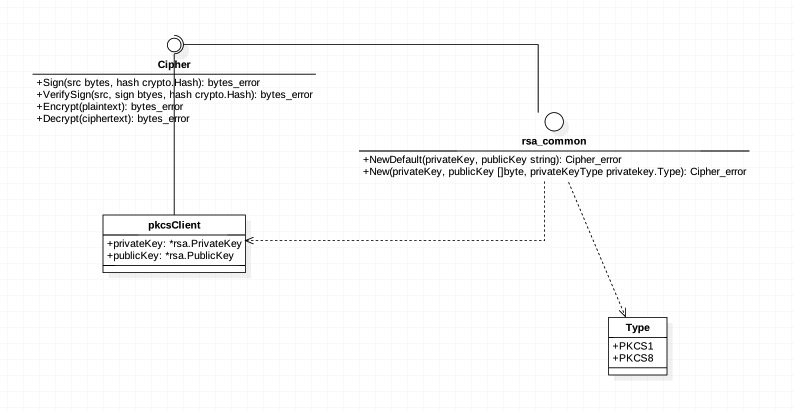Golang加密系列之RSA
发布于 2015-11-07 02:56:19 | 541 次阅读 | 评论: 0 | 来源: PHPERZ
Go语言
Go是一种新的语言,一种并发的、带垃圾回收的、快速编译的语言。Go是谷歌2009年发布的第二款编程语言。2009年7月份,谷歌曾发布了Simple语言,它是用来开发Android应用的一种BASIC语言。
Golang加密系列的最后一篇,嗯,RSA涉及的概念太多,弄了好久才搞清楚。。。
代码的结构如下图

PS:StarUML这玩意在Mac上所有连到Interface的线都变成直线了...我很惆怅...
定义一个对外开放的接口
package rsa
import "crypto"
type Cipher interface {
Encrypt(plaintext []byte) ([]byte, error)
Decrypt(ciphertext []byte) ([]byte, error)
Sign(src []byte, hash crypto.Hash) ([]byte, error)
Verify(src []byte, sign []byte, hash crypto.Hash) error
}
定义私有的pkcsClient ,实现Cipher接口, PKCS格式的私钥都使用这个client
package rsa
import (
"crypto"
"crypto/rand"
"crypto/rsa"
)
type pkcsClient struct {
privateKey *rsa.PrivateKey
publicKey *rsa.PublicKey
}
func (this *pkcsClient) Encrypt(plaintext []byte) ([]byte, error) {
return rsa.EncryptPKCS1v15(rand.Reader, this.publicKey, plaintext)
}
func (this *pkcsClient) Decrypt(ciphertext []byte) ([]byte, error) {
return rsa.DecryptPKCS1v15(rand.Reader, this.privateKey, ciphertext)
}
func (this *pkcsClient) Sign(src []byte, hash crypto.Hash) ([]byte, error) {
h := hash.New()
h.Write(src)
hashed := h.Sum(nil)
return rsa.SignPKCS1v15(rand.Reader, this.privateKey, hash, hashed)
}
func (this *pkcsClient) Verify(src []byte, sign []byte, hash crypto.Hash) error {
h := hash.New()
h.Write(src)
hashed := h.Sum(nil)
return rsa.VerifyPKCS1v15(this.publicKey, hash, hashed, sign)
}
将私钥类型定义成枚举类型
package privatekey type Type int64 const ( PKCS1 Type = iota PKCS8 )
定义一个New/NewDefault函数,用于创建client
package rsa
import (
"crypto/rsa"
"crypto/x509"
"encoding/pem"
"errors"
"toast/rsa/privatekey"
)
//默认客户端,pkcs8私钥格式,pem编码
func NewDefault(privateKey, publicKey string) (Cipher, error) {
blockPri, _ := pem.Decode([]byte(privateKey))
if blockPri == nil {
return nil, errors.New("private key error")
}
blockPub, _ := pem.Decode([]byte(publicKey))
if blockPub == nil {
return nil, errors.New("public key error")
}
return New(blockPri.Bytes, blockPub.Bytes, privatekey.PKCS8)
}
func New(privateKey, publicKey []byte, privateKeyType privatekey.Type) (Cipher, error) {
priKey, err := genPriKey(privateKey, privateKeyType)
if err != nil {
return nil, err
}
pubKey, err := genPubKey(publicKey)
if err != nil {
return nil, err
}
return &pkcsClient{privateKey: priKey, publicKey: pubKey}, nil
}
func genPubKey(publicKey []byte) (*rsa.PublicKey, error) {
pub, err := x509.ParsePKIXPublicKey(publicKey)
if err != nil {
return nil, err
}
return pub.(*rsa.PublicKey), nil
}
func genPriKey(privateKey []byte, privateKeyType privatekey.Type) (*rsa.PrivateKey, error) {
var priKey *rsa.PrivateKey
var err error
switch privateKeyType {
case privatekey.PKCS1:
{
priKey, err = x509.ParsePKCS1PrivateKey([]byte(privateKey))
if err != nil {
return nil, err
}
}
case privatekey.PKCS8:
{
prkI, err := x509.ParsePKCS8PrivateKey([]byte(privateKey))
if err != nil {
return nil, err
}
priKey = prkI.(*rsa.PrivateKey)
}
default:
{
return nil, errors.New("unsupport private key type")
}
}
return priKey, nil
}
最后,看看如何使用上面的代码来进行加密/解密,签名验签
package rsa_test
import (
"crypto"
"encoding/base64"
"encoding/hex"
"fmt"
"testing"
"toast/rsa"
)
var cipher rsa.Cipher
func init() {
client, err := rsa.NewDefault(`-----BEGIN PRIVATE KEY-----
私钥信息
-----END PRIVATE KEY-----`, `-----BEGIN PUBLIC KEY-----
公钥信息
-----END PUBLIC KEY-----`)
if err != nil {
fmt.Println(err)
}
cipher = client
}
func Test_DefaultClient(t *testing.T) {
cp, err := cipher.Encrypt([]byte("测试加密解密"))
if err != nil {
t.Error(err)
}
cpStr := base64.URLEncoding.EncodeToString(cp)
fmt.Println(cpStr)
ppBy, err := base64.URLEncoding.DecodeString(cpStr)
if err != nil {
t.Error(err)
}
pp, err := cipher.Decrypt(ppBy)
fmt.Println(string(pp))
}
func Test_Sign_DefaultClient(t *testing.T) {
src := "测试签名验签"
signBytes, err := cipher.Sign([]byte(src), crypto.SHA256)
if err != nil {
t.Error(err)
}
sign := hex.EncodeToString(signBytes)
fmt.Println(sign)
signB, err := hex.DecodeString(sign)
errV := cipher.Verify([]byte(src), signB, crypto.SHA256)
if errV != nil {
t.Error(errV)
}
fmt.Println("verify success")
}
这里还有一个已经编写好的AES/RSA加解密的包,可以直接引用,github地址:https://github.com/89hmdys/toast
推荐阅读
最新资讯